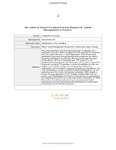My talent or yours? A labour process analysis of talent management in practice
| dc.contributor.author | Kabwe, C | |
| dc.contributor.author | Tripathi, S | |
| dc.date.accessioned | 2019-06-06T13:19:00Z | |
| dc.date.available | 2019-06-06T13:19:00Z | |
| dc.date.issued | 2020-04 | |
| dc.identifier.issn | 1024-5294 | |
| dc.identifier.issn | 1477-2221 | |
| dc.identifier.uri | http://hdl.handle.net/10026.1/14253 | |
| dc.description.abstract |
<jats:p> The article empirically examines the experiences of managers and employees involved in talent management practices. Our empirical aim is to explore the ways in which high-potential employees might also be exposed to a degradation of their employment relationship. We make a theoretical contribution by analysing talent management practices through the conceptual lens of labour process theory. Labour process theory is part of a well-established Marxist approach and we extend this framework to analyse talent management practices in industrial capitalism to offer new insights into how these practices are changing the employment relationships via augmented managerial control and work intensification. Using an employer–employee perspective, we use qualitative data from three multinational companies based in Europe. Our findings indicate the widespread use of ‘softer’ forms of control, alongside work intensification and a general illusion of opportunity and expectations, thus degrading and hollowing out the employment relationship. In effect, talent management practices are increasing workplace pressure through uncompensated talent development activities and are paradoxically debilitating the employment relationships for the ‘talented’ employees. </jats:p> | |
| dc.format.extent | 178-199 | |
| dc.language | en | |
| dc.language.iso | en | |
| dc.publisher | SAGE Publications | |
| dc.rights | Attribution-NonCommercial-ShareAlike 4.0 International | |
| dc.rights | Attribution-NonCommercial-ShareAlike 4.0 International | |
| dc.rights | Attribution-NonCommercial-ShareAlike 4.0 International | |
| dc.rights | Attribution-NonCommercial-ShareAlike 4.0 International | |
| dc.rights | Attribution-NonCommercial-ShareAlike 4.0 International | |
| dc.rights | Attribution-NonCommercial-ShareAlike 4.0 International | |
| dc.rights | Attribution-NonCommercial-ShareAlike 4.0 International | |
| dc.rights | Attribution-NonCommercial-ShareAlike 4.0 International | |
| dc.rights | Attribution-NonCommercial-ShareAlike 4.0 International | |
| dc.rights | Attribution-NonCommercial-ShareAlike 4.0 International | |
| dc.rights | Attribution-NonCommercial-ShareAlike 4.0 International | |
| dc.rights | Attribution-NonCommercial-ShareAlike 4.0 International | |
| dc.rights | Attribution-NonCommercial-ShareAlike 4.0 International | |
| dc.rights.uri | http://creativecommons.org/licenses/by-nc-sa/4.0/ | |
| dc.rights.uri | http://creativecommons.org/licenses/by-nc-sa/4.0/ | |
| dc.rights.uri | http://creativecommons.org/licenses/by-nc-sa/4.0/ | |
| dc.rights.uri | http://creativecommons.org/licenses/by-nc-sa/4.0/ | |
| dc.rights.uri | http://creativecommons.org/licenses/by-nc-sa/4.0/ | |
| dc.rights.uri | http://creativecommons.org/licenses/by-nc-sa/4.0/ | |
| dc.rights.uri | http://creativecommons.org/licenses/by-nc-sa/4.0/ | |
| dc.rights.uri | http://creativecommons.org/licenses/by-nc-sa/4.0/ | |
| dc.rights.uri | http://creativecommons.org/licenses/by-nc-sa/4.0/ | |
| dc.rights.uri | http://creativecommons.org/licenses/by-nc-sa/4.0/ | |
| dc.rights.uri | http://creativecommons.org/licenses/by-nc-sa/4.0/ | |
| dc.rights.uri | http://creativecommons.org/licenses/by-nc-sa/4.0/ | |
| dc.rights.uri | http://creativecommons.org/licenses/by-nc-sa/4.0/ | |
| dc.subject | Talent | |
| dc.subject | talent management | |
| dc.subject | high-potentials | |
| dc.subject | labour process theory | |
| dc.subject | employment relationship | |
| dc.title | My talent or yours? A labour process analysis of talent management in practice | |
| dc.type | journal-article | |
| dc.type | Journal Article | |
| plymouth.author-url | https://www.webofscience.com/api/gateway?GWVersion=2&SrcApp=PARTNER_APP&SrcAuth=LinksAMR&KeyUT=WOS:000523038800005&DestLinkType=FullRecord&DestApp=ALL_WOS&UsrCustomerID=11bb513d99f797142bcfeffcc58ea008 | |
| plymouth.issue | 2 | |
| plymouth.volume | 24 | |
| plymouth.publication-status | Published | |
| plymouth.journal | Competition and Change | |
| dc.identifier.doi | 10.1177/1024529419848647 | |
| plymouth.organisational-group | /Plymouth | |
| plymouth.organisational-group | /Plymouth/Faculty of Arts, Humanities and Business | |
| plymouth.organisational-group | /Plymouth/Faculty of Arts, Humanities and Business/Plymouth Business School | |
| plymouth.organisational-group | /Plymouth/REF 2021 Researchers by UoA | |
| plymouth.organisational-group | /Plymouth/REF 2021 Researchers by UoA/UoA17 Business and Management Studies | |
| plymouth.organisational-group | /Plymouth/REF 2021 Researchers by UoA/UoA17 Business and Management Studies/UoA17 Business and Management Studies MANUAL | |
| plymouth.organisational-group | /Plymouth/Users by role | |
| plymouth.organisational-group | /Plymouth/Users by role/Academics | |
| dcterms.dateAccepted | 2019-03-18 | |
| dc.rights.embargodate | 2020-3-25 | |
| dc.identifier.eissn | 1477-2221 | |
| dc.rights.embargoperiod | Not known | |
| rioxxterms.versionofrecord | 10.1177/1024529419848647 | |
| rioxxterms.licenseref.uri | http://creativecommons.org/licenses/by-nc-sa/4.0/ | |
| rioxxterms.licenseref.startdate | 2020-04 | |
| rioxxterms.type | Journal Article/Review |



